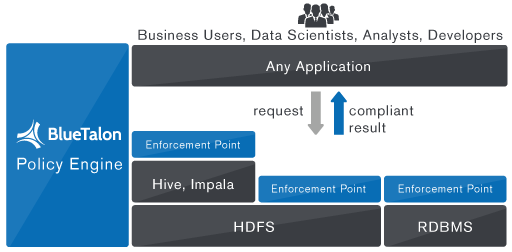Microsoft today announced that it has acquired BlueTalon, a data privacy and governance service that helps enterprises set policies for how their employees can access their data. The service then enforces those policies across most popular data environments and provides tools for auditing policies and access, too.
Neither Microsoft nor BlueTalon disclosed the financial details of the transaction. Ahead of today’s acquisition, BlueTalon had raised about $27.4 million, according to Crunchbase. Investors include Bloomberg Beta, Maverick Ventures, Signia Venture Partners and Stanford’s StartX fund.
“The IP and talent acquired through BlueTalon brings a unique expertise at the apex of big data, security and governance,” writes Rohan Kumar, Microsoft’s corporate VP for Azure Data. “This acquisition will enhance our ability to empower enterprises across industries to digitally transform while ensuring right use of data with centralized data governance at scale through Azure.”
Unsurprisingly, the BlueTalon team will become part of the Azure Data Governance group, where the team will work on enhancing Microsoft’s capabilities around data privacy and governance. Microsoft already offers access and governance control tools for Azure, of course. As virtually all businesses become more data-centric, though, the need for centralized access controls that work across systems is only going to increase and new data privacy laws aren’t making this process easier.
“As we began exploring partnership opportunities with various hyperscale cloud providers to better serve our customers, Microsoft deeply impressed us,” BlueTalon CEO Eric Tilenius, who has clearly read his share of “our incredible journey” blog posts, explains in today’s announcement. “The Azure Data team was uniquely thoughtful and visionary when it came to data governance. We found them to be the perfect fit for us in both mission and culture. So when Microsoft asked us to join forces, we jumped at the opportunity.”
from TechCrunch https://ift.tt/2ZdJCzn
via IFTTT

Comments
Post a Comment